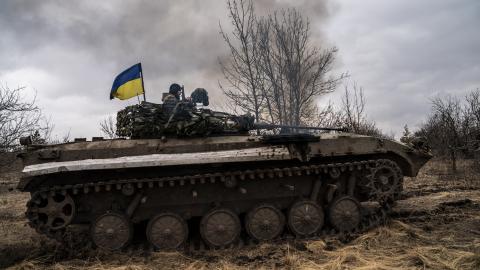At a meeting of the G7 in October 2022, Ukrainian President Volodymyr Zelensky launched his Peace Formula. It consists of 10 points that can lead to a just and honorable end to the war with Russia.
The 10 points address important issues such as respecting Ukraine’s internationally recognized borders, radiation and nuclear safety, the security of food exports, and accountability for war crimes committed during the conflict. It remains the only proposal on the table to end the war in Ukraine.
Zelensky and his government have been promoting the initiative on the world stage with a series of meetings. One of the most important took place last year in Saudi Arabia. It was particularly noteworthy because China also took part.
The importance of Saudi Arabia, indeed all the Gulf states, cannot be overstated in Ukraine’s quest for a just peace. Kyiv knows the Kingdom is influential, not only among other Muslim states but also with many countries in the Global South. Saudi Arabia has also played an important role negotiating prisoner swaps between Ukraine and Russia.
Zelenskyy has visited Saudi Arabia three times since Russia invaded in February 2022. He addressed the Arab League in Jeddah in May 2023, there was the visit for the Peace Formula summit in Jeddah last September, and last month Zelensky was in Saudi Arabia again for talks on the state of the war, the Peace Formula, and Ukrainian-Saudi relations.
When I was in Kyiv last week for meetings with Ukrainian officials, I was surprised by how many references were made to Saudi Arabia. Zelensky’s right-hand man, Andry Yermak, spoke by phone last week with Saudi national security adviser Musaed Al-Aiban about the next meeting on the Peace Formula in Switzerland this summer.
Other Gulf states have played an important role mediating and brokering prisoner exchanges and the release of Ukrainian civilians from Russian custody. Qatar has negotiated the release of Ukrainian children, and the UAE has brokered at least three deals between Ukraine and Russia for the release of prisoners of war.
With so much to focus on in the Middle East, you may wonder why the Gulf states should care about the war at all. There are five main reasons.
The first reason is the issue of food security in the Global South if Ukrainian agricultural exports are restricted because of the war. Many countries in North Africa and the Middle East receive a sizable amount of their grain imports from Ukraine. After an initial disruption in grain exports due to the war, they have returned to pre-war levels. The Gulf states want to ensure it remains this way.
Second, the war offers opportunities for Gulf states to play a bigger role in international diplomacy. In recent years, some have stepped up their diplomatic activity, becoming key interlocutors for engagement between rival and warring parties around the world. Saudi Arabia’s engagement with Ukraine and Russia is a natural extension of this. The same can be said of Qatar and the UAE.
Third, the Iranian angle is important. Since Russia started using Iranian drones in Ukraine, there has been a rapid evolution in Tehran’s drone capabilities due to the lessons being learned there. This could have profound security implications for the Middle East. It also means no country in the world has more experience shooting down Iranian drones than Ukraine. There is no doubt that Gulf states are interested in learning these lessons.
Fourth, the principle of respecting territorial integrity is important for Gulf states. Before Russia annexed Crimea in 2014, the last time a country used military force to annex part of another was when Saddam Hussein invaded Kuwait in 1990 to make it Iraq’s 19th province. Another good comparison with Russia’s occupation of Crimea is Iran’s control over the three UAE islands of Abu Musa and the Greater and Lesser Tunbs, and the presence there of the Revolutionary Guards navy.
Finally, the plight of the Crimean Tatars, the indigenous Sunni Muslim people of the peninsula, should concern many in the Gulf. They have faced persecution for centuries, from Catherine the Great in the 18th century to Stalin in the 20th. Since Russia’s annexation there have been further civil liberty and religious freedom crackdowns aimed at them.
If Russia stopped fighting, the war in Ukraine would end immediately. If Ukraine stopped fighting, its future as a country would be in doubt. So while the Ukrainians must continue fighting for survival, they are also showing the world that they seek a fair and just peace to end the war. This makes the work of Saudi Arabia to help find a just peace and a fair conclusion to the war more important than ever.
In the lead up to the next Peace Formula meeting in the summer, keep an eye on the Gulf states. There is no doubt that they will be playing an important role behind the scenes. This is a positive contribution to peace that should be welcome.

















